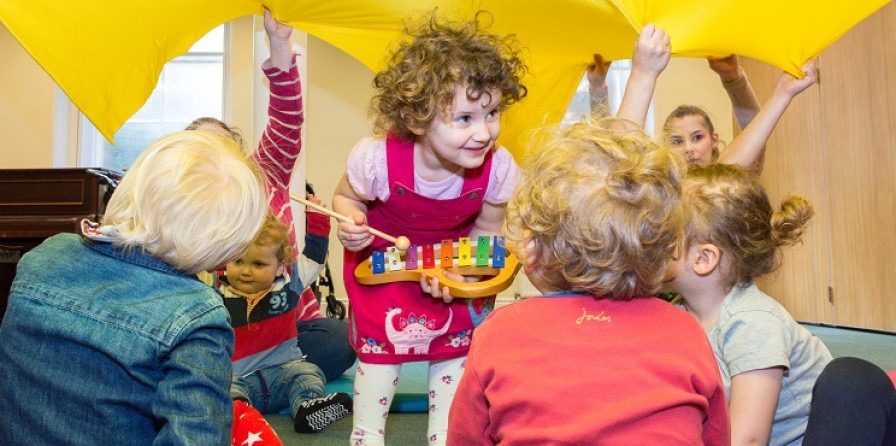Reflections on MERYC-England’s ‘Music in Early Childhood’ Conference

Sally-Anne Brown is an early years specialist working in North Yorkshire and Lancashire, and a member of the NYMAZ Early Years Music Network. She has completed the MA in Early Years Music Education at CREC (Centre for Research in Early Childhood), and has many years’ experience as an instrumental teacher and early years music practitioner. Here she reports back after attending last month’s MERYC-England conference at Colston Hall in Bristol, where she hosted a ‘Pop-up Reflection Stand’ to encourage informal conversations between practitioners in a sector where they can be isolated from their community of practice in day-to-day life.
Sally-Anne Brown
For the past week I’ve been reflecting on the inspiring MERYC (Music Educators and Researchers of Young Children) conference which took place in Bristol last weekend (9th-10th November). From the Yorkshire Dales it was quite a road trip down to Bristol but well worth it.
The conference was titled ‘Music in Early Childhood: New Directions and Valued Traditions’ and had a wealth of presentations and workshops celebrating and supporting our work in the field and in some cases challenging viewpoints. There were so many presentations and workshops that sadly it was impossible to go to all of them but how fantastic to have so much on offer!
A theme running through some of the presentations and workshops I attended was improvisation and play. Both Kate Comberti and Vanessa Stansall spoke of music teachers and practitioners allowing children the space to have their own input and make their own mark in their music lesson or session. It was acknowledged by both presenters that as teachers and group leaders we can sometimes get so wrapped up in delivering a lesson which fits the expectations of the setting or parents that allowing children ‘time to wallow’ (Stansall) goes out of the window, and yet allowing children such space to play musically is vitally important. Steven Grocott in his workshop on Friday night demonstrated how he uses improvisation in his sessions, and I was particularly interested to hear about his use of stories, something I would like to explore more in my own practice. He spoke of co-creating musical stories with the children, asking them for ideas as the story moves along, so that they have mutual ownership of the music within a session.
A highpoint for me was the workshop led by Sophie Fox which was a demonstration of a SALTmusic session, a research project set up in Norfolk which brings together speech and language therapy and EY music practitioners to support the development of children with communication difficulties. In a SALTmusic session there is no pressure to speak and when we conference delegates entered the session area we also were encouraged not to speak. Surrounded by silver foil, washing up bowls, squidgy balls, toy animals, instruments and with parachute material and ribbons dangling from bouncy elastic there was plenty to explore and plenty of non-verbal communication took place with drumming, shaking, whooping, scrunching etc… I found a sequence where the whole group tuned into a specific rhythm particularly moving, speaking again at the end of the session felt strange. This was a great practical demonstration on how to ‘sit back’ as a practitioner, and to follow the lead of the child.
Other presentations I attended were on the use of new technology in the home by young children (Yen-Ting Wu), an area I find challenging as I’m something of a technophobe and tend to shy away from using it in my own sessions! There was a session from Arts Council England on funding, particularly useful to the freelancer (see their website for details), and a fascinating final symposium with lots of interesting discussions led by Jane Parker and Nicola Burke about where early years music fits in relation to arts organisations, higher education, Children’s Centres and more.
My own contribution to the conference was a ‘come and chat’ stand, where delegates were encouraged to come and talk about any aspect of their own work and practice in coffee breaks and over lunchtime. Working in rural Yorkshire as I do is often wonderful, but it can also feel quite lonely. Throughout the day people came over to talk and it was wonderful to meet others in the same area of work who could fully understand the joys and worries of our work as music practitioners.
The icing on the cake though had to be keynote speaker Katherine Zeserson who was absolutely inspirational, and in conversations afterwards I found many others felt the same. She began by saying that we must all ask ourselves ‘What’s my most authentic practice? What is the purpose of what I’m doing?’ She firmly believes that the creative arts and music can bring about social change and that ‘WHAT YOU DO MAKES AN IMPACT’. This statement in itself made me stop and think. In our day to day running about, setting up, getting out instruments etc… what we actually do musically can sometimes become lost and yet we must ensure we keep music and our own authentic practice at the heart of our work, because what we are doing as early years music practitioners IS important.
In all, a fantastic conference which has provided much food for thought, many thanks to the organisers and in particular Jessica Pitt who led proceedings over the weekend. Listening to, singing with and chatting to other researchers and practitioners is richly rewarding, and I encourage anyone working in young children’s music to keep an eye on the MERYC website for details of the next conference.
